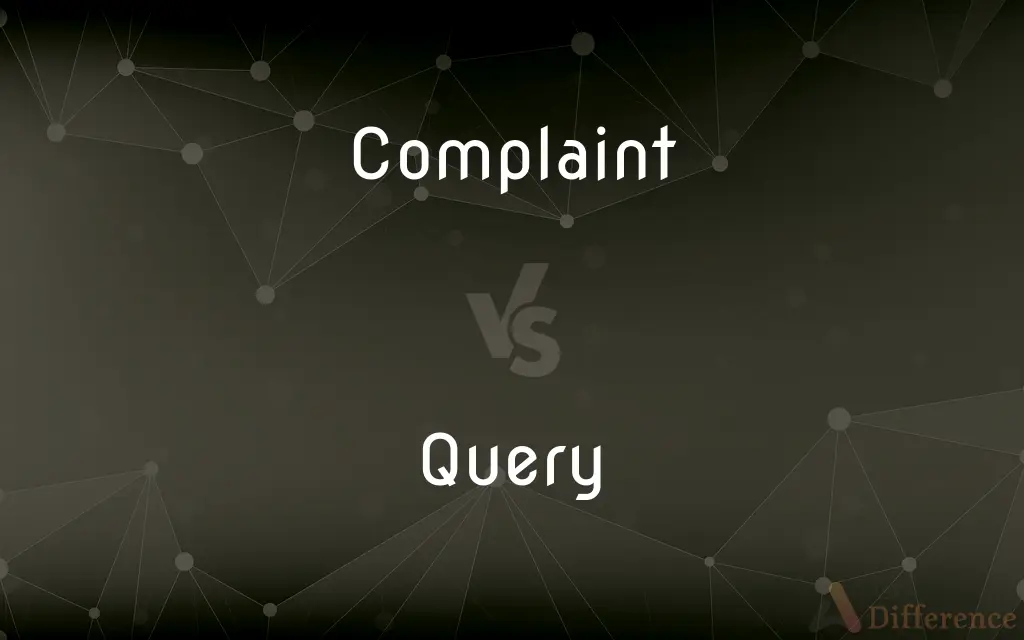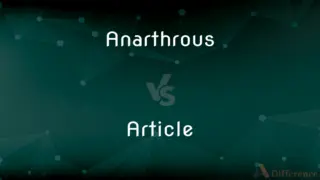Complaint vs. Query — What's the Difference?
Edited by Tayyaba Rehman — By Urooj Arif — Updated on April 16, 2024
Complaint refers to expressing dissatisfaction or a problem, focusing on a grievance; query is about seeking information, often posed as a question.

Difference Between Complaint and Query
Table of Contents
ADVERTISEMENT
Key Differences
A complaint typically involves a formal expression of dissatisfaction or concern about a service or product. This expression highlights issues or faults that the complainer believes need addressing by the responsible party. Whereas, a query is fundamentally a request for information, clarification, or guidance on a particular matter. It usually does not imply dissatisfaction but rather a need for further understanding.
Complaints are often used in scenarios where a customer or user encounters problems with a service or product, leading them to seek redress or resolution from providers. On the other hand, queries might arise from curiosity or a necessity to understand specific details about services, products, or general information, without any underlying tone of discontent.
When filing a complaint, the tone can be critical or even confrontational, as the individual is typically affected negatively by the situation they are describing. Conversely, the tone of a query is usually neutral and inquisitive, reflecting an intent to gather information rather than criticize.
The structure of a complaint often follows a format that outlines the issue, the impact of the issue on the individual, and a desired outcome or request for correction. Whereas, a query is structured simply to elicit information efficiently and clearly, often starting with a direct question or a clear statement of what information is lacking.
In legal or business settings, complaints can trigger formal procedures, investigations, or responses to address the grievances raised. Queries, though they may sometimes lead to changes in information or policies, typically do not result in such formal outcomes.
ADVERTISEMENT
Comparison Chart
Definition
Expression of dissatisfaction with a product/service
Request for information or clarification
Purpose
To seek resolution or address a grievance
To gain understanding or information
Tone
Often critical or confrontational
Neutral and inquisitive
Structural elements
Issue described, impact, desired outcome
Direct questions or statement of information needs
Potential outcomes
May trigger formal responses or resolutions
Generally informational, less likely to trigger formal procedures
Compare with Definitions
Complaint
Formal expression of dissatisfaction.
She filed a complaint about the noise coming from the construction site.
Query
The act of asking questions to obtain information.
Her query about the library's closing hours was answered promptly.
Complaint
A statement that something is unsatisfactory or unacceptable.
Customers made several complaints about the service.
Query
A search command in a database or search engine.
She typed a query into the system to find the book.
Complaint
Legal claim based on an unresolved grievance.
The lawsuit starts with a complaint filed in the court.
Query
A question, especially one addressed to an official or organization.
He sent a query to the support team about his account status.
Complaint
A report of a problem to authorities.
He made a complaint to the city about the potholes on his street.
Query
Request for clarification.
The professor welcomed the student's query during the lecture.
Complaint
In legal terminology, a complaint is any formal legal document that sets out the facts and legal reasons (see: cause of action) that the filing party or parties (the plaintiff(s)) believes are sufficient to support a claim against the party or parties against whom the claim is brought (the defendant(s)) that entitles the plaintiff(s) to a remedy (either money damages or injunctive relief). For example, the Federal Rules of Civil Procedure (FRCP) that govern civil litigation in United States courts provide that a civil action is commenced with the filing or service of a pleading called a complaint.
Query
Expression of doubt or uncertainty about something.
His query about the decision's rationale made them reconsider.
Complaint
An expression of pain, dissatisfaction, or resentment.
Query
A question; an inquiry.
Complaint
A cause or reason for complaining; a grievance
What is your complaint?.
Query
A doubt in the mind; a mental reservation.
Complaint
A bodily disorder or disease; a malady or ailment.
Query
A notation, usually a question mark, calling attention to an item in order to question its validity or accuracy.
Complaint
The symptom or distress about which a patient seeks medical assistance.
Query
To express doubt or uncertainty about; question
Query someone's motives.
Complaint
A formal statement initiating a lawsuit by specifying the facts and legal grounds for the relief sought.
Query
To put a question to (a person).
Complaint
A formal charge, made under oath, of the commission of a crime or other such offense.
Query
To mark (an item) with a notation in order to question its validity or accuracy.
Complaint
The act of complaining.
Query
A question, an inquiry US, an enquiry UK.
The teacher answered the student’s query concerning biosynthesis.
Complaint
A grievance, problem, difficulty, or concern.
I have no complaints about the quality of his work, but I don't enjoy his company.
Query
A question mark.
Complaint
(legal) In a civil action, the first pleading of the plaintiff setting out the facts on which the claim is based;
The purpose is to give notice to the adversary of the nature and basis of the claim asserted.
The purpose is to give notice to the adversary of the nature and basis of the claim asserted.
Query
A set of instructions passed to a database.
The database admin switched on query logging for debugging purposes.
Complaint
(legal) In criminal law, the preliminary charge or accusation made by one person against another to the appropriate court or officer, usually a magistrate.
However, court proceedings, such as a trial, cannot be instituted until an indictment or information has been handed down against the defendant.
However, court proceedings, such as a trial, cannot be instituted until an indictment or information has been handed down against the defendant.
Query
(intransitive) To ask a question.
Complaint
A bodily disorder or disease; the symptom of such a disorder.
Don't come too close; I've got this nasty complaint.
Query
(transitive) To ask, inquire.
Complaint
Expression of grief, regret, pain, censure, or resentment; lamentation; murmuring; accusation; fault-finding.
I poured out my complaint before him.
Grievous complaints of you.
Query
(transitive) To question or call into doubt.
Complaint
Cause or subject of complaint or murmuring.
The poverty of the clergy in England hath been the complaint of all who wish well to the church.
Query
To pass a set of instructions to a database to retrieve information from it.
Complaint
An ailment or disease of the body.
One in a complaint of his bowels.
Query
To send a private message to (a user on IRC).
Complaint
A formal allegation or charge against a party made or presented to the appropriate court or officer, as for a wrong done or a crime committed (in the latter case, generally under oath); an information; accusation; the initial bill in proceedings in equity.
Query
To send out a query letter.
Complaint
An often persistent bodily disorder or disease; a cause for complaining
Query
A question; an inquiry to be answered or solved.
I shall conclude with proposing only some queries, in order to a . . . search to be made by others.
Complaint
(formerly) a loud cry (or repeated cries) of pain or rage or sorrow
Query
A question in the mind; a doubt; as, I have a query about his sincerity.
Complaint
An expression of grievance or resentment
Query
An interrogation point [?] as the sign of a question or a doubt.
Complaint
(civil law) the first pleading of the plaintiff setting out the facts on which the claim for relief is based
Query
To ask questions; to make inquiry.
Each prompt to query, answer, and debate.
Query
To have a doubt; as, I query if he is right.
Query
To put questions about; to elicit by questioning; to inquire into; as, to query the items or the amount; to query the motive or the fact.
Query
To address questions to; to examine by questions.
Query
To doubt of; to regard with incredulity.
Query
To write " query" (qu., qy., or ?) against, as a doubtful spelling, or sense, in a proof. See Quære.
Query
An instance of questioning;
There was a question about my training
We made inquiries of all those who were present
Query
Pose a question
Common Curiosities
What is a query?
A query is a request for information, clarification, or for answering a doubt.
Can a query lead to a complaint?
Yes, if information obtained from a query reveals a problem, it may lead to a complaint.
Is the tone important in a complaint or query?
Yes, complaints often have a critical tone, whereas queries are typically neutral.
What is a complaint?
A complaint is an expression of dissatisfaction regarding a service, product, or situation.
How do complaints and queries differ in purpose?
Complaints aim to resolve grievances; queries seek to gather information.
What settings are complaints most commonly used in?
Complaints are common in customer service, legal, and governmental settings.
What is important to include in a query to get the best response?
Specific questions and a clear outline of the information or clarification needed are crucial.
What outcomes can complaints lead to?
Complaints can trigger investigations, resolutions, or formal changes.
What should be included in a query?
A query should clearly state the information needed or the question being asked.
Can both complaints and queries be written formally?
Yes, both can be formal, but complaints often follow stricter formats due to their nature.
How should one structure a complaint?
A complaint should clearly outline the issue, its impact, and the resolution sought.
How can understanding the difference between a complaint and a query be beneficial?
Knowing the difference helps in choosing the right form of communication to achieve desired outcomes.
What should someone avoid in a complaint?
Avoid vague language and unclear demands; be specific about grievances and desired outcomes.
What is usually the outcome of a query?
Queries mostly lead to the provision of requested information or clarification.
Where are queries most commonly used?
Queries are used in academic, technical, customer service, and everyday information-seeking contexts.
Share Your Discovery

Previous Comparison
Blackbird vs. Merl
Next Comparison
Anarthrous vs. ArticleAuthor Spotlight
Written by
Urooj ArifUrooj is a skilled content writer at Ask Difference, known for her exceptional ability to simplify complex topics into engaging and informative content. With a passion for research and a flair for clear, concise writing, she consistently delivers articles that resonate with our diverse audience.
Edited by
Tayyaba RehmanTayyaba Rehman is a distinguished writer, currently serving as a primary contributor to askdifference.com. As a researcher in semantics and etymology, Tayyaba's passion for the complexity of languages and their distinctions has found a perfect home on the platform. Tayyaba delves into the intricacies of language, distinguishing between commonly confused words and phrases, thereby providing clarity for readers worldwide.














































